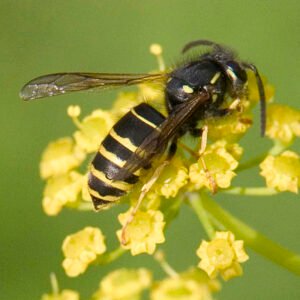Given that many cats spend a significant amount of time outside, it’s only natural that they will come into contact with local wildlife, ideally nothing too large! However, cats frequently come into contact with bees, wasps, and other stinging insects, and they are unlikely to be pleased.
In the spring and fall, younger cats are more likely to get stung because wasps are dozier, more likely to be caught, and hence fight back. What should you check for and do if your cat has been stung by a wasp?

Most cats will be annoyed and in pain after being stung by a wasp, but they will recover — and will most likely not learn their lesson and be stung again later!
However, some cats can have life-threatening allergic reactions to wasp venom, so keep an eye on your cat and take it to the doctor if it is struggling to breathe or has unusual swellings.
How to Tell If Your Cat Has Been Stung
When cats are in pain or ill, they are masters at hiding, but there are several signs to look out for.
When a cat is stung for the first time, it may likely yowl in pain, leap around, or claw at itself. Some cats also hide and run, becoming more withdrawn as a result.
Check the lips, nose, and belly of your cat in case it has been stung. A wasp sting might also cause the following symptoms:
- When they first came inside, they began nibbling or licking a body part.
- Swelling, redness, itching, and irritation, usually on the paws, face, and nose. (This will be more difficult to notice in long-haired cats.)
- Pain
- slapping the face
- Hives
- Having trouble breathing or swallowing
- Drooling, vomiting, diarrhea, rapid breathing, difficulty breathing, pale gums, and collapse are all symptoms of a heart attack. When a cat develops an allergic reaction to a wasp sting, this is what they look like.
Most cats will be alright after a few minutes, but it’s vital to keep an eye on your cat for approximately an hour after a sting because that’s when an allergic reaction can happen. A sting that does not induce an allergic reaction can cause discomfort for several hours.
Is it true that wasp stings kill cats?
Wasp stings are rarely life-threatening or lethal to cats, but they can be irritating. Symptoms of an allergic reaction or repeated stings include difficulty breathing and eating.
Stings can constrict the airways, necessitating a trip to the veterinarian as soon as possible. Cats may limp for a few days as a result of stings on their paws, but this typically goes away. My cat had been stung by a wasp. So, what’s next?
The more stings a cat receives, the more probable he or she will develop a venom allergy. This is due to the cat’s immune system overreacting to the venom and being more sensitive to the stinging. A reaction like this might be lethal if not treated properly by a veterinarian. So if you do have a cat and fear that this can happen please contact a wasp control Chicago exterminator immediately.
How to Aid Your Cat in Getting Over a Wasp Sting
Wasp stings are extremely painful for cats, and while they may not require medical attention, they may want assistance in managing and healing faster. You can assist your cat heal from a moderate wasp sting by doing the following:
- A cold, moist cloth or ice cubes wrapped in a towel can help to reduce swelling. Although your cat may not appreciate it, a cold compress can greatly assist in making your cat more comfortable.
- Avoid biting or scratching the sting with your cat. It’s possible that your cat’s instinct to bite or scratch the wound will slow the healing process. To keep cats off their injuries, use a head cone or cat boots.
- Keep your cat fed and hydrated. If your cat has been stung by a mouse or in the nose, give it food and water. It’s simpler to handle soft meals here.
- Soak the wound in water with baking soda or in an oatmeal bath to relieve the pain. A modest amount of toothpaste or chamomile lotion can also help. These substances work because they neutralize the venom’s acidic nature.
- Antihistamines, like Benadryl, can be beneficial, but consult your veterinarian for the proper dosage and substances to avoid.
Is There a Way to Keep a Wasp from Stinging My Cat?
Unlike toddlers, who can be taught to avoid wasps and bees, cats are notoriously difficult to train. Stinging your cat may discourage them for a while, but depending on the cat, they may try to play and catch them again later, resulting in another sting!
The easiest method to avoid stings is to make sure your property is free of wasps and beehives, and to keep your cat away from common bee and wasp hotspots like flowers and garbage cans.
One of the finest things you can do for your cat when it’s outside is to keep an eye on it, but this isn’t always possible. The average outdoor cat will be stung at least once, so keep an eye out for it.
Conclusion
Fortunately, most cats will only have minor swelling and pain as a result of wasp stings, which will go away in a matter of hours or days.
Swelling in the mouth, throat, or nose could cause breathing or eating issues. Your worry and the usage of cold packs will bother most cats, who will be OK!
Have you ever had a wasp sting your cat? What did you have to do to get it to go away? For the best pest control results and learning more about Can Wasp Stings Kill Cats, please contact Preyon Pest Control at (708)232-7703.

